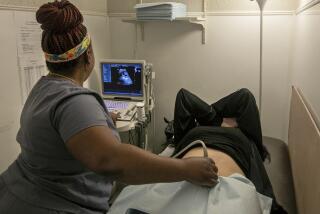Counselors Present Test Options
- Share via
Because so many factors influence the selection of a prenatal test, some physicians recommend that couples first meet with a genetic counselor. The counselor explains the tests as well as such issues as medical and genetic history.
The counseling, however, overwhelms some couples.
“I find that a number of patients are quite surprised that they do have options,” says Carole Hansult, a Los Angeles genetic counselor. “It usually poses some difficulties to them. You might say we’re putting too much on the plate all at once.”
Newlyweds Denise and Bob Cook of Beverly Hills were surprised and thrilled to learn they would have a baby this summer. But during a recent meeting with a genetic counselor, their joy turned to anxiety. They were told that their ages--she is 37, he is 42--placed the fetus in a high-risk genetic category.
“I never really knew what the risks were over 35,” Denise says. “All of a sudden you get hit in the face with all these facts and all these astounding figures. The differences in getting pregnant in your 20s compared to over 35, you think, ‘I’m sure there’s a mistake.’ ”
At age 25, the risk of having a child with Down syndrome is one in 1,250 and the risk of chromosomal abnormality is one in 476. At age 35, Down syndrome risk increases to one in 378; chromosomal abnormality risk climbs to one in 192.
The Cooks also learned that they had several options for fetal tests.
“I didn’t have the faintest idea several choices were available,” Denise says. “I heard there was amniocentesis and that’s it.”
Hansult says couples usually listen to her one- to two-hour presentation, go home and then decide. She tries not to influence them:
“The role of the genetic counselor or the physician doing the test is to try to provide the couple with the facts in a balanced way and not to use anything, including body language, to influence them one way or another. This is probably the most personal decision they are going to make.”
Genetic counselors receive special college-level training in both the medical and psychological aspects of prenatal testing. Some are employed by hospitals or prenatal clinics, others work for private obstetricians.
The Cooks decided that Denise should undergo early amniocentesis this month. And although they are eager to complete the test, they are grateful for the options.
“I think about it a lot and get nervous,” Denise says. “But the early testing is preparing you for anything that might go wrong.”






